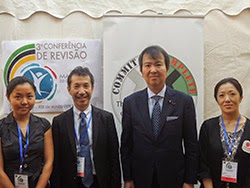 |
| Three staff attended Maputo Summit: (from right) Bashir BAASER from Afghanistan Office, Harumi KAWAGOE from Sudan Office, and Masumi HONDA from Tokyo Office (June 23, 2014) |
The Ottawa Treaty bans the use, stockpiling, production and transfer of anti-personnel mines outright and requires the States Parties to destroy their stockpiles and clear buried mines. Since the treaty entered into force in 1999, 161 nations, including Japan, have ratified or signed the treaty as of July 2014. The review conference is held every five years to examine the results and progress of the matters provided in the treaty, as well as to adopt action plans for the next five years. Fifteen years after the treaty came into effect, the third review conference took place this year, following the previous two conferences in Nairobi and Cartagena.
AAR Japan sent staff who are involved in mine action: Bashir BAASER from Afghanistan Kabul Office, Harumi KAWAGOE from Sudan Khartoum Office, and Masumi HONDA from Tokyo Office. Government officials and observers including international NGO, civil society groups and mine victims all gathered, and the conference hall was filled with enthusiasm.
About the Host Country Mozambique
Mozambique, the host country of the recent conference was among the most affected by mines until recent years; a result of the War of Independence that lasted from the 1960s, and the civil war that started shortly after the country's independence in 1974. When the Mozambican government began its mine action in 1993, a profusion of mines had been buried across the nation; and it seemed as though a complete clearance was unachievable. Nonetheless, the country announced its plan to complete the mine clearance by the end of 2014, and it has become a model of successful mine action and now gives hopes to other nations with severe mine problems.
"Mine-Free World" By 2025!
 |
| Photo taken at the review conference (June 23, 2014) |
Many of the nations suffering severe mine contamination are also developing nations facing harsh economic conditions. Mine action strategies, including mine clearance and victim assistance, require a lengthy time-frame, substantial resources and manpower. The key to success is gaining the cooperation of the international community, including advanced nations with no mine contamination. Having ratified the Ottawa Treaty in 1998, Japan has no current mine contamination and has completed the destruction of its stockpiles, except for those used for research and training purposes. Nevertheless, the country contributes a large amount of funds and technology to a number of projects to address mine problems in other countries.
Oman Announces Intention to Become the 162nd State Party; the United States Expresses Intention to Join
Since the second review conference in Cartagena, five countries have joined the Ottawa Treaty, and 28 countries have completed the destruction of anti-personnel mines in mined areas as required by the treaty. During the Maputo Summit, Oman announced its plan to join the treaty in July this year and was welcomed as the 162nd State Party. Meanwhile, 36 countries, including the United States and China, remain as States not Party, many of which are Asian countries. The United States has been criticized by the international community for retaining the right to use mines while being the largest source of mine action funds. The country attended the Maputo Summit as an observer and expressed its intention to join the treaty, although no clear timeline was set forth, and also announced that it would abstain from producing anti-personnel mines.
AAR Makes Statements on Gender and Mine Risk Education
 |
| Harumi and Bashir gave a presentation at a side event (June 25, 2014) |
In Afghanistan, female adults are not permitted to participate in training sessions with male trainers. Therefore, AAR has formed a new mine risk education team with two female trainers. Since the leaders of the target communities are male, however, in an effort to adapt to Afghanistan’s gender norms, AAR Japan sends male staff to negotiate with the male leaders and to arrange for the training sessions.
In some conservative regions in Sudan, residential areas for men and women are completely separated, allowing only female trainers to visit some villages for women. AAR Japan has been able to gain the trust of the women in these villages thanks to the female staff who fully respect the local culture and customs. AAR Japan also remarked that when women who did not have access to education before due to gender restrictions receive mine risk education, they learn that they too have the right to gain information to protect their lives and those of their families, helping them improve their lives in the future.
While the achievements of the past 15 years were recognized, a number of continuing issues were highlighted in the Maputo Summit, including the existence of States not Party, cases of new use of landmine, and missed deadlines for stockpile destruction. Hoping that the State Parties will focus on mine action further in line with the action plan and declaration adopted in the Maputo Summit, AAR will continue its efforts in mine-affected areas.
Japanese-English translation by Ms Satoko KOYAMAEnglish editing by Mr Allan RICHARDZ
The article on this page has been translated by volunteers as part of the AAR Volunteer Programme. Their generous contributions allow us to spread our activities and ideas globally, through an ever-growing selection of our reports from the field.

